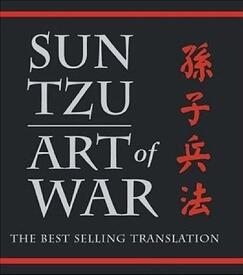
At times building a business can feel like outright war. Business by nature is competitive. Many business leaders have studied military strategy in order to enhance their business acumen. One of the foremost texts being Sun Tzu's ancient manuscript, “The Art of War”, written over 2500 years ago. Sun Tzu's thesis is to “win all without fighting,” or to capture the market without falling into a financial blood bath against your competition. Teachings from this book are applicable to an entrepreneurs' wins and losses on the business battlefield – the marketplace.
Sun Tzu says, “If you know the enemy and you know yourself, you need not fear the result of a hundred battles.”
Sun Tzu admonishes us to study our competition in order to ascertain what gaps they are leaving in the marketplace. This is primarily intended to avoid engaging the established competition head-on, which will ultimately lead to a financial blood bath. By keeping a finger on the pulse of technologies and consumer/social changes and shifts, a good business leader can know his competition's weaknesses as well as his own. This can also allow him to focus on his strengths in order to attack the opportunities in the marketplace that are under-served by his competition.
Sun Tzu says, “Victorious warriors win first and then go to war, while defeated warriors go to war and then seek to win it.”
Sun Tzu's words underscore the importance of the lean product development methodology. This methodology focuses on creating a minimal version of the product with core features, test launching that product and the incrementally improving it from early user feedback. This proposed capital- efficient exercise conserves resources and focuses the team's attention on the product itself. Once the product is fine-tuned to a version with features guided by user feedback, then it will be ready for a larger scaled launch. In essence, this is a “win” before going to war.
Sun Tzu says, “Defeated warriors go to war first and then seek to win.” This can be demonstrated with product failures. There are many product failures, but one that comes to mind was the “New Coke” soft drink. Clearly something went drastically wrong with this product.
Sun Tzu says, “Confront them with annihilation, and they will then survive; plunge them into a deadly situation and they will then live. When people fall into danger, they are then able to strive for victory.”
This phrase speaks of intensity and commitment as well as creativity. Small, passionate teams that are dedicated and focused on a common mission are extremely effective and can achieve anything, especially when they are given the lee-way they need to creatively overcome challenges and set-backs. When everyone on the team has bought into an all-or-nothing mentality and given the freedom to create, each is capable of achievement far beyond what they ever thought possible.
Sun Tzu's ideas are timeless principles that entrepreneurs and business leaders can implement in order to have clarity of their mission, their purpose, and their commitment to the success of their team's objectives. While it may feel a bit silly for business owners to liken themselves to ancient warfare generals, Sun Tzu's teachings apply and they are implemented in some manner by today's successful entrepreneurs. What rules do you use in your business to bring about success?



